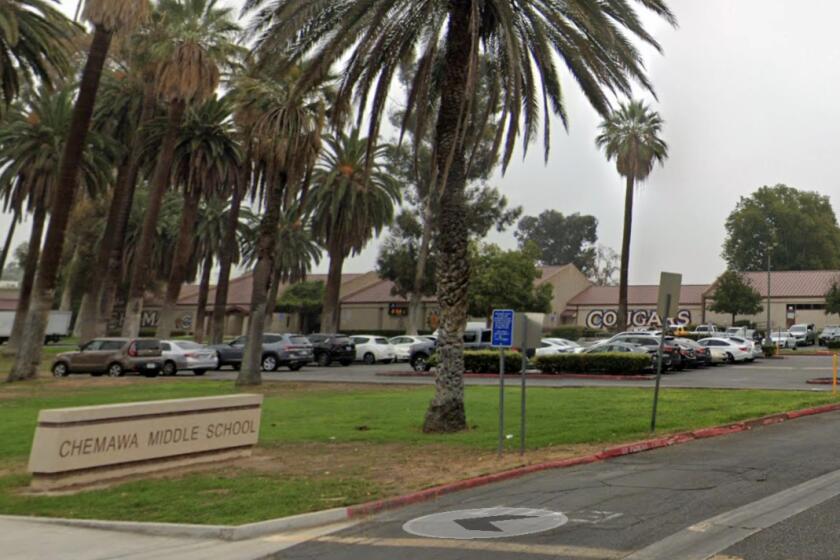Dean Felled by Scandal Had 2 Faces
The boy who began life in a Midwest trailer park worked his way as a young man into the chambers of the U.S. Supreme Court, where he clerked for Justice Sandra Day O’Connor.
Though at times restrained and even shy, he rose to the top job at one of the nation’s leading law schools, displaying a charm in public that sometimes dazzled donors, alumni and colleagues. He became a mentor and friend to students at UC Berkeley’s Boalt Hall School of Law; they lined up outside his office to see him.
And then John P. Dwyer risked it all.
These days, according to friends, he sits alone in his cliff-side condominium in North Beach, reading supportive e-mail and simmering over a sexual harassment charge that forced him, on the eve of Thanksgiving, to resign as Boalt Hall’s dean.
The intensely private Dwyer opens his morning paper to read detailed accounts of how he allegedly fondled and undressed a law student while she was passed out drunk. His mood, friends say, ranges from sadness to fury. In a terse statement on the day he resigned, he admitted only to a single consensual -- albeit inappropriate -- sexual encounter with a student that did not involve intercourse. He has not spoken publicly since.
Boalt Hall was Dwyer’s world. Now 51, he received his law degree there and taught in its classrooms for 18 years, the last two as dean. “It was everything to him, his family, his life,” said June Beltran, his third wife. Beltran, who is more than 10 years younger than Dwyer, began dating him when she was a third-year law student. They are now divorced.
Tall and attractive, the dean worked hard. The lights in his office often burned till midnight. He had a knack for raising money -- crucial at a public school that hopes to compete with private institutions like Stanford and Harvard, which have large endowments.
Dwyer was “so powerfully smart and so remarkably dedicated to this institution that even though he’s not a particularly outgoing or social person, he grew to embrace the idea of fund-raising with the greatest possible commitment,” said Louise Epstein, Boalt’s assistant dean for alumni relations and development. Many students said they felt he truly cared for them. He was always accessible, at times holding office hours in the school cafe.
But there was another side to him: He had a reputation for dating female students far younger and less powerful than he.
Andy Dwyer, his younger brother, said in an interview Sunday that when he learned John had to resign as dean, “My first reaction to that was I bet it is sexual harassment.” John would boast about having sex with students, said Andy Dwyer, a sex discrimination lawyer in New Jersey who has been estranged from his brother for more than 10 years. “He was really proud of the fact that he could seduce women.”
‘Bill Clinton of Boalt’
Even after Dwyer became dean in 2000, students joked about his alleged flirtations and dalliances. He was dubbed by some the “Bill Clinton of Boalt Hall.”
One source at the law school who declined to be identified said that “a lot of women are attracted to him, and he loves it -- people idolize him, and he feeds off that.” But the source never heard anyone Dwyer has dated complain about him.
Monique Morales, 31, who took a class from Dwyer, said she is troubled by what she has read of the complaint against him, but she never saw any hint of impropriety. She attended a student party at his home, and the students afterward cajoled him into going dancing with them, she said.
University policy prohibits dating that raises a “conflict of interest” -- which officials say bars professors from dating students currently in their classes. UC Berkeley officials, without discussing Dwyer’s case, say that deans are not supposed to date students in their school.
But the allegations against Dwyer go beyond simple dating; the young woman who lodged the complaint against him in October alleges he sexually assaulted her. According to the alleged victim’s lawyer, the woman had been drinking with friends from the law school in December 2000. She ran into Dwyer, who offered to drive her home. He came inside to use the bathroom.
The attorney, Laura Stevens, said her client passed out on her bed, and when she awoke in the middle of the night, she found Dwyer, fully clothed, with his head resting on her chest, intimately touching her. She had been partially undressed.
Just ‘Flirtatious’
Beltran is skeptical. “Perhaps he is flirtatious, but he is not a criminal,” she said. “I would host parties for his students all the time. He had these young, beautiful law students falling all over him. He was warm, charming and witty. But that is different from sexual assault.”
Dwyer’s marriage to Beltran ended in divorce when “he fell in love with someone else,” Beltran said softly. She said she did not know whether his new interest at the time was a student. Beltran referred to herself as Dwyer’s second wife, and his colleagues at Boalt also said she was his second wife, but she was actually his third. His brother Andy said that John’s first marriage was to a Kentucky women he met in college. Asked about this Sunday, Beltran said John had implored her to keep his short first marriage a secret. The second wife declined to be interviewed.
Students and faculty say Dwyer moved in a law school culture where faculty are expected to socialize with students, to invite small groups to their homes and to attend law school functions where heavy drinking is often the norm.
“He was caught halfway between generations,” said an adjunct professor at Boalt who asked not to be identified by name. “Ten, 20 years ago, professors thought [sleeping with female law students] was one of the perks of the job.
“But then the revolution came.... He is young enough to know better, to know the rules, but the temptation is just so great.”
Dwyer is a baby boomer, born in the Midwest in 1951. Close friends said he had an unhappy childhood. The eldest of four children, Dwyer grew up in Grand Rapids, Mich.
Andy Dwyer said their parents came from impoverished backgrounds -- their maternal grandfather was a coal miner. When John was an infant, he and his parents lived for a short time in a mobile home. But the family prospered. Their father eventually became a corporate executive, and the family had a comfortable, upper-middle class lifestyle, Andy Dwyer said. Beltran said John Dwyer had ugly memories of his early years, and his brother does not dispute that this might be the case. Andy Dwyer said their mother was a disciplinarian.
During their seven years of marriage, Beltran never met a single member of his family, she said. When his father died, his brothers called him, and his sister e-mailed him. “He didn’t even call us back,” Andy Dwyer said. He said he stopped talking to John when John refused to have contact with their other siblings.
Dwyer went to DePauw University in Indiana as a rector scholar, an honor given to students who have shown “extraordinary academic achievement,” and majored in chemistry and math. He won a National Science Foundation Fellowship, an academic coup, and went to graduate school at the prestigious California Institute of Technology in Pasadena.
After one year at Caltech, Dwyer told his advisor, Aron Kuppermann, that he wanted to pursue law instead of science because law would give him more contact with people and be socially useful.
Kuppermann talked Dwyer into earning his PhD in chemical physics anyway -- which he did in four years, rather than the usual five. On his thesis, he thanked Kuppermann and even acknowledged his parents.
Dwyer excelled in law just as he had in science. He graduated at the top of his class, and managed to publish scientific papers while at Boalt. After clerking for O’Connor and U.S. Court of Appeals Justice Harry E. Edwards, Dwyer could have pursued a lucrative career in a pedigreed law firm. Instead, he joined the public defender’s office in Washington, D.C., a prestigious post.
Joe Feldman, a major donor to Boalt, remembers Dwyer being asked once how he could have defended bad people. According to Feldman, Dwyer said: “They’re not bad people.... They are ordinary people in terrible trouble.”
Feldman recalled the words last week, echoing them as he described Dwyer’s predicament: It’s “a case of a good person doing a bad thing.”
Dwyer returned to Boalt Hall in 1984 as a law professor. Again he soared, winning a teaching award in 1997.
Paul Marchegiani, 25, who took a “properties” class from Dwyer two years ago, said Dwyer was the best teacher he had at Boalt. “He had a gift for making you stay interested,” Marchegiani said.
Dwyer alienated some faculty members with his acerbic edge. But when he was promoted to replace Dean Herma Hill Kaye two years ago, Dwyer tempered his blunt manner. He worked to make the faculty and student body more diverse, courted alumni donors and raised large amounts of money for the school.
Kate Gordon, an Oakland lawyer who is a friend, said running the school eventually began to gnaw at him emotionally.
“I think it was kind of killing him,” she said. “Every decision that went wrong really affected him. He really loved that school.”
In his final speech to alumni, six days before his resignation, he gave no hint of the pressures that engulfed him. Epstein, the assistant dean for alumni relations, recalled him as “dazzling,” even “with the sword of Damocles hanging over him.”
Now, at his condominium off a path with no street sign, the buzzer to his condo is always busy. He does not answer his telephone. A friend said he feels besieged.
“Teaching is the thing he loved most in the world -- I don’t think there is any question about that,” said his friend Gordon. “And I don’t think he is going to get to teach again.”
*
Times correspondent Michelle Munn contributed to this report.
More to Read
Sign up for Essential California
The most important California stories and recommendations in your inbox every morning.
You may occasionally receive promotional content from the Los Angeles Times.











